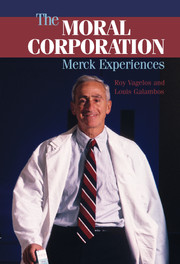Preface
Published online by Cambridge University Press: 05 June 2012
Summary
“Man that is born of woman,” the Book of Job tells us, “is of few days and full of trouble.” Our experiences in business, in science, in government service, and in academic life give us plenty of reasons to affirm Job's insight. The evening news, the morning newspaper, and the Internet provide fresh evidence every day of a troubled world. But we also find cause for hope in the everyday events that don't make it into the media, events that inspire the kind of hope that runs through the New Testament and our study of the moral corporation.
Here is a story of life and leadership in an American multinational, one of the world's leading pharmaceutical companies, Merck & Co., Inc. Merck and the entire pharmaceutical industry are headline news today – mostly bad news. Controversies over public safety, prices, and the ability of the industry to develop the new drugs and vaccines that society needs are swirling through the United States, Europe, and the developing nations.
Those controversies are not new, and they provide a backdrop for this account of the business career of Roy Vagelos, who was head of research and then CEO at Merck from the mid-1970s through the mid-1990s. His experiences in this vital industry include a long, sometimes painful, but ultimately successful attempt to introduce at the Merck laboratories a novel approach to new drug development. Success with targeted research started Merck on a path that would lead the company to a series of blockbuster therapies and to the very top of the global industry.
- Type
- Chapter
- Information
- The Moral CorporationMerck Experiences, pp. vii - xPublisher: Cambridge University PressPrint publication year: 2006



